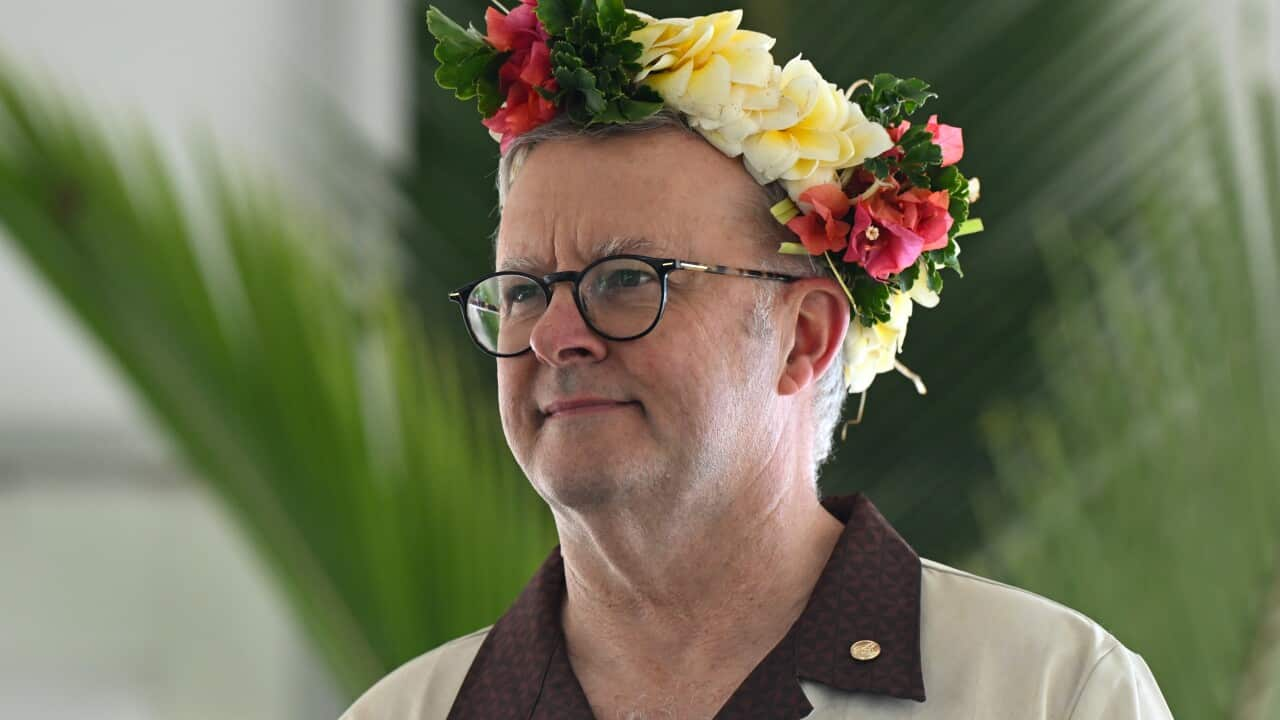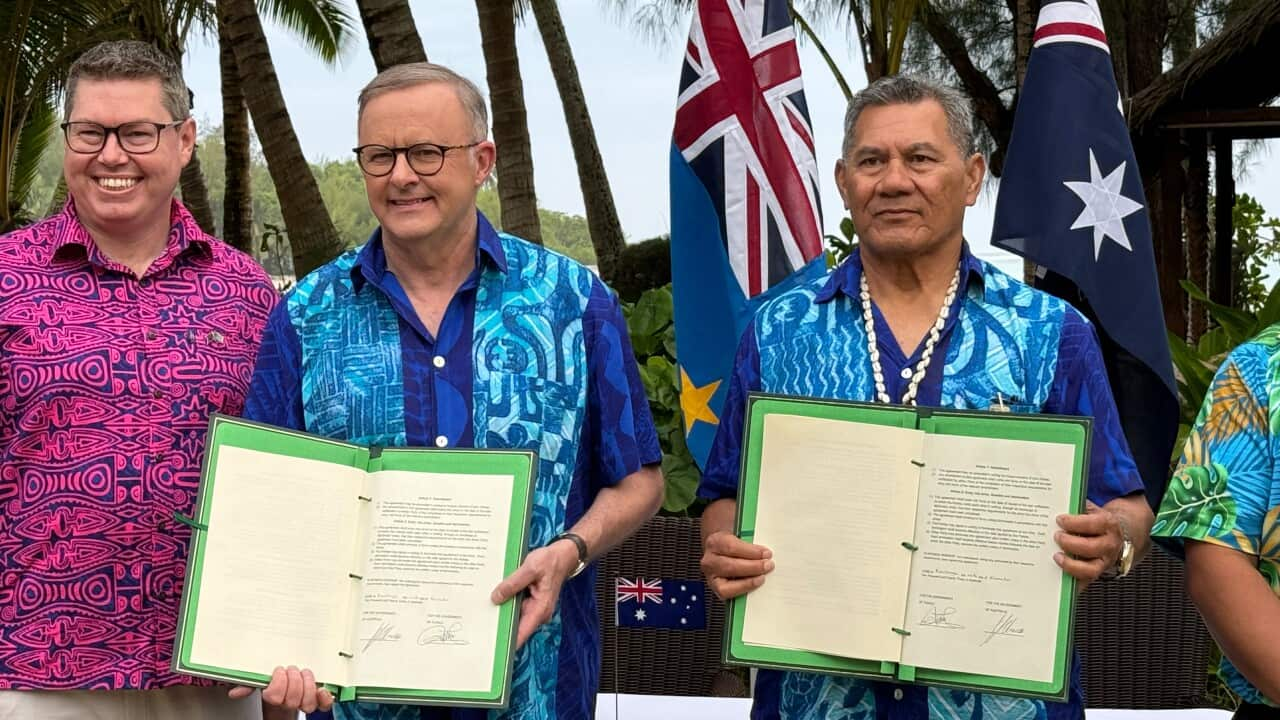Australia walked away with a strategic security victory at this week's Pacific Islands Forum (PIF).
But the annual summit, held in the Tongan capital Nuku’alofa this year, wasn't without its bumps — figuratively and literally, with a 6.6 magnitude earthquake marking its opening.
These are the main takeaways.
'Pacific-led', Australian-paid policing
A on the first day of talks has been hailed as a strategic victory for Australia, effectively cementing it as the region’s security partner of choice.
The federal government will spend $400m over four years to train Pacific police forces in Brisbane, with four more regional training hubs to be set up.
Under the plan, up to 200 police from different Pacific Island nations could be deployed to assist with natural disasters, major events, or peacekeeping efforts.
Leaders from Tonga, Fiji, Palau and Papua New Guinea backed the idea as "Pacific-led", pointing to unmet needs as Pacific nations deal with a rise in transnational crime like drug trafficking, as well as .
Critically, the initiative is opt-in, with caveats for "national consultation" and each nation able to contribute as much or as little as it wants.
That reflects concerns raised by Solomon Islands, Vanuatu and some Melanesian nations that the PPI would be used by Australia and New Zealand to carve China out of the region and drag Pacific nations further into .
Hot mic or candid camera?
Hours after all 18 PIF members endorsed the PPI, a private conversation between Prime Minister Anthony Albanese and US Deputy Secretary of State Kurt Campbell was posted online.
It threatened to rock years of diplomatic efforts.
In the video, Campbell appeared to suggest he had approached Australia’s US ambassador Kevin Rudd about pursuing US-led Pacific policing deals.
"I talked with Kevin about it and so, you know, we were going to do something, and he asked us not to, so we did not," Campbell says in the video.
"We've given you the lane, so take the lane."
Albanese then joked the US could “go us halfsies in the cost".

Anthony Albanese receives a kahoa lei on arrival for the 53rd Pacific Islands Forum Leaders Meeting. Source: AAP / Lukas Coch
"Fundamentally, [the Pacific] is not the US’s 'lane' to give," Sora said.
"It’s a good thing we have professional diplomats throughout the Pacific, not just Australian prime ministers, working on tough issues."
The Australian government and its media advisors have vehemently denied it was a “hot mic” incident, with Albanese labelling Radio New Zealand journalist Lydia Lewis, who captured the video, “unethical.”
"I myself, were I a journalist, would not do that," Albanese said. "Journalists tend to identify themselves.
For her part, Lewis said: "I was just filming and taking photos from my story.”
Ultimately, Albanese brushed it off, and Beijing officially responded by saying it "welcomes efforts from all parties" to contribute to the region.
China demands 'correction' of Taiwan status quo
Hours after the final PIF leader’s communique was published online, China's Ambassador to the Pacific Qian Bo demanded the document be "corrected” after leaders resolved Taiwan should have continuing representation at the forum.
"The situation is obvious, among the 18 members of the PIF, 15 countries have diplomatic relations with China, and 15 countries have categorically stated they stand by the One China principle," Qian told reporters.
"So this is a surprising mistake made by someone ... I think it must be corrected."
The communique then disappeared from the PIF website. It was republished on Saturday morning without reference to Taiwan.
Solomon Islands, which , had indicated it would move to strip Taiwan of its PIF observer status.
But in the end, the status quo prevailed.
Over recent years, the number of PIF nations that recognise Taiwan as separate from China has fallen from six to three — with Palau, Tuvalu and Marshall Islands remaining.
Beijing claims Taiwan as a part of its territory and has been vocal about its plans for reunification under its "One China Principle".
Taiwan, which has its own constitution and has been governed separately since 1949, maintains it is independent despite never formally declaring separation from China.
Sea levels are rising
The United Nations Secretary-General Antonio Guterres addressed the summit and warned the Pacific is on the brink of “climate catastrophe", as sea levels across the region rise by more than double the global average.
At last year’s PIF Australia and Tuvalu signed the Falepili Union — a climate pact that legally binds Australia to aid the low-lying island nation in the event of climate crisis, disease, or military attack.
In exchange, Australia gets veto power over any security agreement Tuvalu enters.
This week, the leaders quite literally put on a big song to celebrate the pact coming into effect.

Leaders from Pacific Island nations gathered in Tonga for the 53rd Pacific Islands Forum Leaders Meeting. Source: AAP / Lukas Coch
"Opening and subsidising and exporting fossil fuels is immoral and unacceptable," Talia said.
Despite that, Australia’s commitment to hosting the COP31 climate summit in partnership with the Pacific has been officially “welcomed” by PIF members.
‘Fact-finding mission’ in New Caledonia to go ahead
There was a breakthrough in the impasse between France and New Caledonia over who should host a PIF leader’s visit to the French territory.
For months New Caledonia has experienced civil unrest and riots amid the French territory’s struggle for independence, and there had been hope PIF members could play a larger role in conflict resolution — something France had been reluctant to accept.
A "fact-finding mission" comprising three PIF members was postponed last week due to acrimony between Paris and Noumea over who should host the visit.
French ambassador to the Pacific Veronique Roger-Lacan attended the summit in Nuku’alofa and told media that the nations had now agreed to share hosting duties.
"[France] is absolutely attached to the principle of information sharing and transparency," Roger-Lacan said.
The visit will likely take place before October, when leaders meet again in Samoa for the Commonwealth Heads of Government Meeting.



